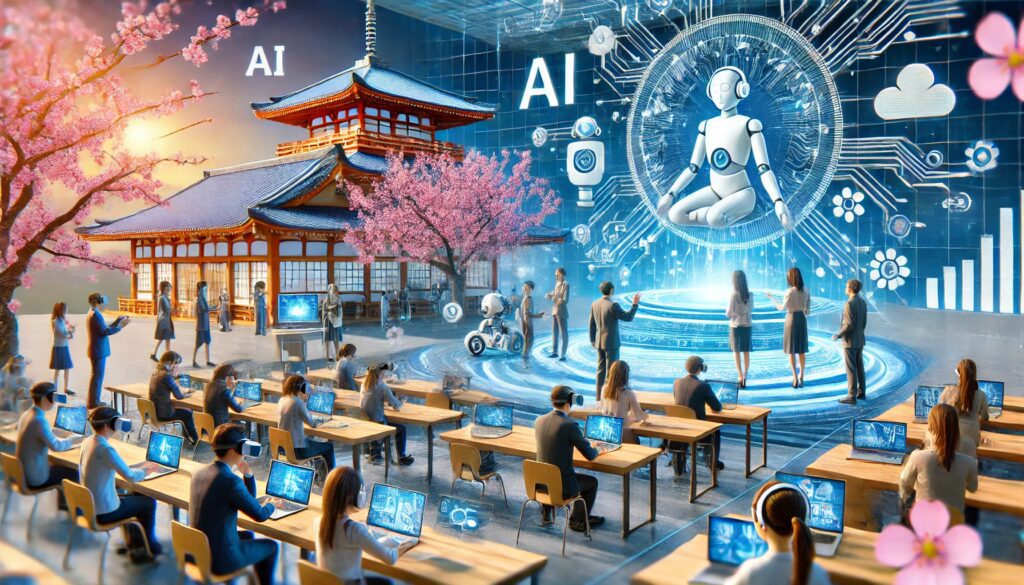
Japan’s AI Roadmap
Artificial Intelligence (AI) is significantly reshaping industries across Japan, driving remarkable advancements and fostering groundbreaking innovations.
With major investments and strategic collaborations, Japan is positioning itself as a global leader in AI technology.
Japan has been at the forefront of technological innovation for decades. With its advanced infrastructure, skilled workforce, and strong government support, Japan is well-positioned to be a global leader in artificial intelligence (AI). This roadmap outlines the key strategies, goals, and initiatives Japan is undertaking to foster AI development and integration across various sectors.

Vision and Goals
- Vision: To establish Japan as a leading global AI innovator, enhancing economic growth, societal well-being, and technological leadership.
- Goals:
- Achieve world-class AI research and development.
- Promote AI integration across industries.
- Ensure ethical AI deployment.
- Foster a skilled AI workforce.
- Strengthen international collaboration.
The endeavor will advance AI innovation on a global scale and contribute significantly to both the scientific community and the public good.
— Farnam Jahanian, President of Carnegie Mellon University
Strategic Pillars for AI Development in Japan
1. Research and Development (R&D)
Japan’s AI strategy is heavily focused on enhancing its research and development capabilities through several strategic initiatives.
1.1 Investment in AI Research
Objective:
- Increase funding for AI research in universities and specialized institutions to foster innovation and maintain global competitiveness.
Actions:
- Government Grants: The Japanese government has committed substantial funds to AI research through various grants and subsidies. The Moonshot R&D Program, for example, is a major initiative aimed at achieving significant technological breakthroughs by 2050.
- Private Sector Investment: Companies like Microsoft have announced significant investments in Japan’s AI and cloud infrastructure, enhancing the nation’s research capabilities (Source).
- Academic Funding: Universities and research institutions are receiving increased funding to support AI research, focusing on areas such as machine learning, natural language processing, and robotics.
1.2 Collaborative Projects
Objective:
- Promote joint AI projects between academia, industry, and government to facilitate the exchange of knowledge and accelerate innovation.
Actions:
- University-Industry Partnerships: Initiatives like the $110 million collaboration between the University of Washington, University of Tsukuba, Carnegie Mellon University, and Keio University exemplify efforts to integrate academic research with industrial applications (AI News).
- Public-Private Collaborations: The Japanese government is encouraging collaborations between public institutions and private companies, such as the partnerships involving tech giants like Nvidia and Amazon in AI research projects (Enterprise Technology News and Analysis).
- International Collaborations: Japan is also fostering international research partnerships to leverage global expertise and enhance its AI capabilities. For example, joint research efforts with the US National Institute of Standards and Technology (NIST) in quantum computing and AI (AI News).
1.3 AI Centers of Excellence
Objective:
- Establish dedicated centers for cutting-edge AI research to position Japan as a leader in AI innovation.
Actions:
- National AI Institutes: The creation of AI Centers of Excellence across the country, such as the new Microsoft Research Asia lab in Tokyo, which focuses on embodied AI and societal AI applications (Source).
- Specialized Research Hubs: Universities and research institutions are developing specialized hubs for AI research. For example, the Advanced Telecommunications Research Institute International (ATR) is known for its work in communication technologies and AI.
- Support for Startups: The government and private sector are also supporting AI startups through programs like the Generative AI Accelerator Challenge (GENIAC), which helps startups develop foundational AI technologies (Source).
As economic activities in the digital space increase, it is important for the Japanese industry as a whole to work with global companies like Microsoft that are equipped with a set of digital infrastructure. We appreciate Microsoft’s announcement of its new investment in Japan.
— Prime Minister Fumio Kishida
Industrial Application of AI in Japan
1. Manufacturing
Objective:
- Leverage AI to enhance automation, precision, and efficiency in manufacturing processes.
Actions:
- Automation and Robotics: AI is being integrated into robotic systems to automate complex manufacturing tasks, improving precision and reducing human error. Companies like Fanuc and Kawasaki Robotics are leading in AI-driven robotics for manufacturing.
- Predictive Maintenance: AI algorithms analyze sensor data from manufacturing equipment to predict failures before they occur, thus reducing downtime and maintenance costs. Mitsubishi Electric uses AI for predictive maintenance in its factories.
- Quality Control: AI-powered vision systems inspect products for defects with higher accuracy and speed compared to traditional methods. Panasonic has developed AI systems that enhance quality control in electronics manufacturing.
Impact:
- Enhanced productivity and efficiency.
- Reduced operational costs.
- Improved product quality and consistency.
2. Healthcare
Objective:
- Integrate AI for predictive diagnostics, personalized medicine, and robotic surgery.
Actions:
- Predictive Diagnostics: AI is used to analyze medical data and predict diseases at early stages, improving patient outcomes. For example, AI developed by Fujitsu is used to detect cancer and other diseases from medical imaging.
- Personalized Medicine: AI algorithms analyze patient data to tailor treatments to individual needs. RIKEN’s AI research focuses on using genomic data to develop personalized treatment plans.
- Robotic Surgery: AI-driven surgical robots, such as those developed by Sony and the University of Tokyo, assist surgeons in performing precise and minimally invasive procedures.
Impact:
- Improved diagnostic accuracy.
- Customized treatment plans.
- Enhanced surgical precision and patient recovery times.
3. Automotive
Objective:
- Develop AI for autonomous driving, traffic management, and smart logistics.
Actions:
- Autonomous Driving: Companies like Toyota and Nissan are investing heavily in AI to develop self-driving cars. These AI systems can navigate, detect obstacles, and make driving decisions in real-time.
- Traffic Management: AI is used to optimize traffic flow and reduce congestion in urban areas. Hitachi’s AI systems are deployed in smart cities to manage traffic lights and public transportation schedules.
- Smart Logistics: AI optimizes logistics and supply chain operations by predicting demand, managing inventory, and routing delivery vehicles efficiently. Yamato Transport uses AI to enhance its logistics and delivery services.
Impact:
- Increased road safety.
- Reduced traffic congestion.
- Improved efficiency in logistics and supply chain management.
4. Finance
Objective:
- Implement AI for fraud detection, algorithmic trading, and customer service automation.
Actions:
- Fraud Detection: AI systems analyze transaction data to identify and prevent fraudulent activities in real-time. Japan’s major banks, like MUFG, use AI to enhance their fraud detection capabilities.
- Algorithmic Trading: AI algorithms execute trades at high speeds and improve the efficiency of financial markets. Nomura Securities uses AI-driven trading strategies to optimize investment returns.
- Customer Service Automation: AI-powered chatbots and virtual assistants provide 24/7 customer support, handling queries and transactions. Mizuho Bank employs AI chatbots to improve customer service and operational efficiency.
Impact:
- Enhanced security and fraud prevention.
- Increased trading efficiency and profitability.
- Improved customer satisfaction and reduced operational costs.

Education and Workforce Development in AI in Japan
1. Curriculum Development
Objective:
- Integrate AI-related subjects into school and university curriculums to prepare future generations for an AI-driven world.
Actions:
- Elementary and Secondary Education: The Japanese Ministry of Education, Culture, Sports, Science and Technology (MEXT) is incorporating AI-related content into the school curriculum, emphasizing basic programming and data science skills from early education levels (Enterprise Technology News and Analysis).
- Higher Education: Universities like the University of Tokyo and Kyoto University are expanding their AI programs to include courses in machine learning, natural language processing, and robotics. These programs aim to equip students with advanced AI knowledge and practical skills (AI News).
- Specialized AI Institutes: Establishment of dedicated AI research centers and institutes within universities to focus on cutting-edge AI research and provide specialized education and training to students (Source).
Impact:
- Enhanced understanding of AI concepts among students.
- Development of a skilled workforce ready to tackle AI challenges.
- Increased interest in AI careers among young learners.
2. Professional Training
Objective:
- Offer continuous learning programs for professionals to upskill in AI and stay current with technological advancements.
Actions:
- Corporate Training Programs: Companies like Hitachi and Fujitsu offer extensive AI training programs for their employees to enhance their skills in AI applications and technologies (Enterprise Technology News and Analysis).
- Online Courses and Certifications: Collaboration with platforms like Coursera, Udacity, and local e-learning providers to offer AI courses and certifications accessible to working professionals (AI News).
- Government Initiatives: The Japanese government, through programs like the Human Resource Development Program for AI Professionals, provides grants and support for continuous AI education and training for professionals across various industries (Source).
Impact:
- Workforce equipped with up-to-date AI skills.
- Increased productivity and innovation within companies.
- Greater adaptability to AI-driven changes in various industries.
3. Talent Attraction
Objective:
- Create initiatives to attract and retain global AI talent, ensuring a diverse and skilled workforce.
Actions:
- International Collaboration and Exchange Programs: Partnerships with international universities and research institutions to facilitate the exchange of AI researchers and students. Programs like the Japan-IMF Scholarship Program for Advanced Studies help attract global talent to Japanese institutions (AI News) (Source).
- Incentives for Foreign Talent: Introduction of policies to provide attractive incentives, such as competitive salaries, research grants, and streamlined visa processes, to attract top AI talent from around the world (Enterprise Technology News and Analysis).
- Innovation Hubs: Development of AI innovation hubs in cities like Tokyo and Osaka, offering state-of-the-art research facilities and a collaborative environment for AI professionals (Source).
Impact:
- Increased influx of global AI talent to Japan.
- Enhanced diversity and innovation in the AI sector.
- Strengthened global partnerships and collaboration in AI research.

Ethical and Regulatory Framework for AI in Japan
1. Ethical Guidelines
Objective:
- Develop comprehensive guidelines for the ethical development and use of AI to ensure responsible innovation and deployment.
Actions:
- Government-Led Initiatives: The Japanese government has issued the “Social Principles of Human-Centric AI” which emphasizes transparency, fairness, and accountability in AI systems (Enterprise Technology News and Analysis) (AI News).
- Industry Standards: Collaboration with industry bodies to create sector-specific ethical guidelines. For instance, the Japan Business Federation (Keidanren) has published guidelines for AI utilization in business contexts (Source).
- Academic Contributions: Universities and research institutions like the University of Tokyo are actively researching AI ethics and publishing papers that guide ethical AI practices (Enterprise Technology News and Analysis).
Impact:
- Encourages the development of AI technologies that respect human rights and societal values.
- Provides a framework for companies and developers to follow, ensuring ethical considerations are embedded in AI projects.
- Enhances public trust in AI technologies.
2. Data Privacy
Objective:
- Strengthen data protection laws to ensure the privacy and security of individuals’ data in AI applications.
Actions:
- Amendments to APPI: Japan’s Act on the Protection of Personal Information (APPI) has been updated to address new challenges posed by AI, including stricter regulations on data handling and increased penalties for violations (AI News).
- Guidelines for Anonymization: The Personal Information Protection Commission (PPC) of Japan provides detailed guidelines on data anonymization to balance data utility and privacy (Source).
- International Compliance: Ensuring that Japan’s data protection framework aligns with global standards like the GDPR to facilitate international collaboration and data flow (Enterprise Technology News and Analysis).
Impact:
- Enhanced protection of personal data against misuse and breaches.
- Increased confidence among citizens regarding the use of their data in AI systems.
- Facilitates international data sharing and collaboration while ensuring compliance with global privacy standards.
3. AI Governance
Objective:
- Establish regulatory bodies to oversee AI implementation and address the legal implications of AI technologies.
Actions:
- Creation of AI Oversight Bodies: Establishment of the AI Utilization Promotion Council to monitor AI development and ensure compliance with ethical and legal standards (AI News).
- Regulatory Frameworks: Development of comprehensive AI governance frameworks that outline the responsibilities of various stakeholders, including developers, users, and policymakers (Source).
- Public Consultation and Involvement: Engaging with the public, industry experts, and academia to continuously update and refine AI governance policies, ensuring they remain relevant and effective (Enterprise Technology News and Analysis).
Impact:
- Ensures that AI technologies are developed and used in a manner that is safe, ethical, and beneficial to society.
- Provides clear guidelines and regulations for AI developers and users, reducing legal uncertainties and risks.
- Promotes transparency and accountability in AI systems, fostering public trust and acceptance.

Infrastructure Development for AI in Japan
1. High-Performance Computing
Objective:
- Invest in supercomputing resources to support AI research and development.
Actions:
- AI Bridging Cloud Infrastructure (ABCI): Japan has developed one of the world’s most powerful AI supercomputers, the ABCI, which offers 32.6 petaflops of processing power. This infrastructure supports complex AI model training and big data analytics, facilitating advancements in various AI applications (Enterprise Technology News and Analysis) (AI News).
- Fugaku Supercomputer: Developed by RIKEN and Fujitsu, Fugaku is currently the world’s fastest supercomputer. It is utilized for a wide range of AI research, from healthcare and drug discovery to disaster prevention and climate modeling (AI News) (Source).
- Future Investments: Ongoing investments are planned to further enhance Japan’s high-performance computing capabilities, ensuring researchers have access to cutting-edge technology.
Impact:
- Accelerates AI research and development.
- Provides researchers and industries with the computational power needed for complex AI tasks.
- Positions Japan as a leader in supercomputing and AI innovation.
2. Data Ecosystem
Objective:
- Create robust data-sharing frameworks to facilitate AI development.
Actions:
- Open Data Initiatives: The Japanese government promotes open data initiatives, encouraging public and private sectors to share data for AI research. These initiatives aim to create a comprehensive and accessible data ecosystem (Enterprise Technology News and Analysis).
- Data Anonymization and Security: Guidelines and technologies for data anonymization ensure that shared data protects individual privacy while remaining useful for AI research. The Personal Information Protection Commission (PPC) plays a key role in overseeing these practices (AI News).
- Collaborative Platforms: Establishment of platforms such as Data Trading Marketplaces that allow companies and researchers to exchange datasets securely and efficiently. These platforms enhance collaboration and data availability for AI projects (Source).
Impact:
- Facilitates access to large datasets essential for training AI models.
- Encourages innovation through data-driven research and development.
- Ensures data privacy and security while promoting data sharing.
3. 5G and IoT Integration
Objective:
- Expand 5G networks and IoT infrastructure to support AI applications.
Actions:
- 5G Network Expansion: Japan is rapidly deploying 5G networks nationwide, providing the high-speed, low-latency connectivity required for advanced AI applications. Telecom companies like NTT Docomo and SoftBank are leading the 5G rollout (Enterprise Technology News and Analysis) (Source).
- IoT Infrastructure Development: Investment in IoT infrastructure is enabling the integration of AI in various sectors such as smart cities, healthcare, and manufacturing. Companies are developing IoT devices and sensors that collect real-time data for AI analysis and decision-making (AI News).
- Smart City Initiatives: Projects like the Kashiwa-no-ha Smart City integrate 5G and IoT to create a highly connected urban environment. These initiatives aim to improve urban living through AI-driven solutions for traffic management, energy efficiency, and public safety (Source).
Impact:
- Supports real-time AI applications and services.
- Enhances connectivity and data collection for AI systems.
- Drives innovation in sectors such as healthcare, manufacturing, and urban development.
International Collaboration on AI in Japan
1. Global Partnerships
Objective:
- Form alliances with other nations for joint AI research and standards development.
Actions:
- US-Japan AI Collaboration: A recent $110 million partnership has been established between universities and tech companies from both the US and Japan to advance AI research. This includes collaborations between the University of Washington, University of Tsukuba, Carnegie Mellon University, and Keio University, backed by companies like Nvidia, Microsoft, and Amazon (Enterprise Technology News and Analysis) (AI News).
- EU-Japan Collaboration: Japan is also partnering with the European Union on various AI research projects, focusing on ethical AI, data protection, and AI applications in healthcare and smart cities (AI News).
- Asia-Pacific Cooperation: Collaborations with countries like South Korea, Singapore, and Australia to foster regional AI innovation and develop common standards for AI technology (Source).
Impact:
- Enhances Japan’s AI research capabilities through international expertise.
- Promotes the development of global AI standards.
- Facilitates the exchange of knowledge and best practices in AI development.
2. Participation in Global Forums
Objective:
- Engage in international AI forums to share knowledge and influence policy.
Actions:
- G7 AI Initiative: Japan actively participates in the G7’s AI initiatives, working with other member countries to develop policies that promote ethical AI use and address challenges related to AI governance (AI News).
- OECD AI Policy Observatory: Japan is a member of the OECD’s AI Policy Observatory, which aims to shape global AI policies through collaboration and knowledge sharing among member countries (Source).
- United Nations AI for Good Summit: Japan participates in the UN’s AI for Good Summit, contributing to discussions on how AI can be used to achieve the Sustainable Development Goals (SDGs) and improve global welfare (Enterprise Technology News and Analysis).
Impact:
- Positions Japan as a leader in global AI policy-making.
- Encourages international cooperation in addressing AI-related challenges.
- Provides a platform for Japan to share its AI advancements and ethical guidelines.
3. Exchange Programs
Objective:
- Promote exchange programs for researchers and students to foster global collaboration.
Actions:
- Japan-US Research Exchange: As part of the recent US-Japan AI collaboration, exchange programs are being established between participating universities to facilitate the movement of researchers and students across borders (Enterprise Technology News and Analysis).
- EU-Japan Joint Master’s Program: Joint degree programs in AI and data science are being developed between Japanese and European universities to enhance academic exchange and collaboration (AI News).
- Asia-Pacific Research Fellowships: Fellowships and scholarships are provided to researchers from the Asia-Pacific region to study and conduct AI research in Japan, fostering regional collaboration and innovation (Source).
Impact:
- Enhances the skills and knowledge of Japanese researchers through international exposure.
- Strengthens global research networks and collaboration.
- Promotes cultural exchange and understanding in the AI research community.

Smart Cities and AI in Japan
Japan is leveraging AI to develop smart cities that incorporate advanced technologies to improve urban living conditions. These initiatives focus on creating more efficient, sustainable, and livable urban environments, addressing critical issues like congestion and energy consumption.
1. AI-Driven Urban Planning
Objective:
- Utilize AI to optimize urban planning processes and create more sustainable city layouts.
Actions:
- Kashiwa-no-ha Smart City:
- This project integrates AI to manage energy use, transportation, and community services. AI algorithms optimize the use of renewable energy sources and balance energy distribution across the city (Enterprise Technology News and Analysis).
- Fujisawa Sustainable Smart Town:
- Developed by Panasonic, this smart city leverages AI to integrate renewable energy, smart homes, and efficient transportation systems, aiming to reduce carbon emissions and improve quality of life for residents (AI News).
Impact:
- Enhanced sustainability through optimized energy use and reduced emissions.
- Improved urban infrastructure planning and resource allocation.
- Increased resilience against environmental challenges.
2. Traffic Management Systems
Objective:
- Implement AI-powered traffic management systems to reduce congestion and enhance mobility.
Actions:
- AI Traffic Control in Tokyo:
- Tokyo has deployed AI systems to manage traffic lights and optimize traffic flow. These systems analyze real-time data from sensors and cameras to reduce congestion and improve travel times (Source).
- Smart Mobility Solutions:
- Companies like Toyota are developing AI-driven mobility services that include autonomous vehicles and intelligent transport systems to provide efficient and safe transportation options (Enterprise Technology News and Analysis).
Impact:
- Reduced traffic congestion and improved traffic flow.
- Enhanced public transportation efficiency.
- Increased safety on roads through better traffic management.
3. Energy Management
Objective:
- Use AI to enhance energy efficiency and sustainability in urban areas.
Actions:
- Smart Grids:
- AI-powered smart grids in cities like Yokohama monitor and manage electricity use, integrating renewable energy sources and ensuring efficient energy distribution (AI News).
- Building Management Systems:
- AI systems in smart buildings optimize heating, ventilation, and air conditioning (HVAC) systems to reduce energy consumption and improve indoor air quality (Source).
Impact:
- Increased energy efficiency and reduced costs.
- Enhanced integration of renewable energy sources.
- Improved environmental sustainability and reduced carbon footprint.
Key AI Research Projects in Japan
Japan has embarked on several high-impact AI research projects that aim to position the country as a global leader in AI innovation. Here are some of the most notable initiatives:
1. Moonshot R&D Program
Objective:
- The Moonshot R&D Program is an ambitious government initiative aiming for radical technological advancements by 2050, with AI playing a central role.
Key Focus Areas:
- Healthcare: Developing AI technologies for early disease detection, personalized treatment plans, and innovative medical solutions.
- Agriculture: Implementing AI to enhance agricultural productivity through precision farming, smart sensors, and automated machinery.
- Environmental Sustainability: Utilizing AI for climate change mitigation, resource management, and energy efficiency.
- Mobility: Advancing AI in autonomous transportation, logistics optimization, and smart infrastructure.
Notable Projects:
- AI for Aging Society: Researching AI solutions to support an aging population, including robotics for elderly care and smart home systems.
- Disaster Resilience: AI-driven systems for disaster prediction, response, and recovery to enhance national resilience against natural calamities.
2. AI Bridging Cloud Infrastructure (ABCI)
Objective:
- ABCI is Japan’s premier AI supercomputing initiative, designed to provide cutting-edge computational resources for AI research and development.
Key Features:
- High Performance: Capable of performing 32.6 petaflops, making it one of the most powerful supercomputers globally dedicated to AI.
- Energy Efficiency: Recognized for its energy-efficient design, contributing to sustainable computing practices.
- Open Access: Available to both public and private sectors, facilitating widespread AI research and innovation.
Applications:
- AI Model Training: Supporting complex AI model training, including deep learning and neural networks.
- Big Data Analytics: Enabling large-scale data processing for industries such as finance, healthcare, and manufacturing.
- Collaborative Research: Promoting joint projects between academic institutions, research organizations, and businesses.
3. AI Hospital Project
Objective:
- The AI Hospital Project aims to revolutionize healthcare by integrating AI technologies into hospital systems for improved patient care and operational efficiency.
Key Components:
- Predictive Diagnostics: Using AI algorithms to analyze medical data for early disease detection and prognosis.
- Personalized Medicine: Tailoring treatment plans to individual patients based on AI-driven analysis of genetic, lifestyle, and environmental factors.
- Operational Efficiency: Implementing AI for hospital management tasks such as scheduling, resource allocation, and patient flow optimization.
Technological Innovations:
- Medical Imaging: AI-enhanced imaging techniques for accurate and rapid diagnosis of conditions such as cancer, cardiovascular diseases, and neurological disorders.
- Robotic Surgery: Integrating AI with surgical robots to improve precision, reduce recovery times, and enhance surgical outcomes.
- Telemedicine: AI-powered telehealth platforms to provide remote consultations, monitoring, and treatment, especially in underserved regions.
4. Other Notable Projects
Advanced Telecommunications Research Institute International (ATR):
- Focuses on AI applications in communication technologies, including natural language processing, speech recognition, and human-computer interaction.
NEDO AI Projects:
- The New Energy and Industrial Technology Development Organization (NEDO) funds multiple AI projects targeting industrial applications, smart manufacturing, and energy solutions.
Tokyo University AI Initiatives:
- Leading research in AI ethics, governance, and policy, along with cutting-edge technological developments in AI.
US-Japan AI Collaboration
(Enterprise Technology News and Analysis) (AI News)
Recently, the US and Japan have announced a $110 million investment to bolster joint AI research initiatives. This funding, supported by major tech companies like Nvidia, Microsoft, Amazon, and several Japanese firms, aims to strengthen partnerships between institutions such as the University of Washington and the University of Tsukuba, as well as Carnegie Mellon University and Keio University. These collaborations will focus on areas like multimodal and multilingual learning, AI for robotics, autonomous AI integration with humans, and AI applications in life sciences and scientific discovery
Microsoft’s Investment in Japan
(Enterprise Technology News and Analysis) (AI News)
Microsoft has committed to investing $2.9 billion in Japan over the next two years to enhance AI and cloud infrastructure. This includes opening the first Microsoft Research Asia lab in Tokyo, which will focus on embodied AI, societal AI, and scientific discovery. The investment also aims to train 3 million people in AI skills, emphasizing digital inclusion and cybersecurity. This initiative coincides with Japan’s broader goals to stimulate its economy and tackle societal challenges through digital transformation (Source).
Challenges and Mitigation Strategies
- Data Availability: Promote open data initiatives and public-private partnerships for data sharing.
- Skill Gap: Invest heavily in AI education and professional training programs.
- Ethical Concerns: Proactively develop and enforce ethical guidelines and regulatory frameworks.
- Global Competition: Strengthen international alliances and continuously innovate to stay competitive.
Society 5.0 in Japan
Society 5.0 is a strategic initiative introduced by Japan aimed at creating a super-smart society where digital and physical spaces are seamlessly integrated. It represents a significant shift from the current Information Society (Society 4.0) to a new paradigm driven by advanced technologies like AI, IoT, big data, and robotics.
Key Objectives and Features
- Human-Centric Approach:
- Unlike previous societal transformations, Society 5.0 focuses on placing human well-being at the center. It aims to resolve societal challenges by leveraging cutting-edge technology while ensuring inclusivity and sustainability.
- Integration of Cyber and Physical Spaces:
- Society 5.0 envisions a harmonious integration of cyberspace and physical space. This means that every individual and object will be connected via the Internet of Things (IoT), and data from these connections will be analyzed by AI to provide optimized solutions and services (Source).
- Key Areas of Impact:
- Healthcare: Use of AI and robotics to provide personalized medical care and support aging populations.
- Agriculture: Implementation of smart farming techniques to increase productivity and ensure food security.
- Infrastructure: Development of smart cities with AI-driven traffic management, energy-efficient buildings, and disaster resilience.
- Logistics: Optimized supply chains and autonomous transportation systems to improve efficiency and reduce environmental impact.
Implementation and Challenges
Implementation:
- The Japanese government has launched various programs and initiatives to promote the development of Society 5.0. These include investments in R&D, support for startups, and collaboration with international partners to advance technological innovation and application (Enterprise Technology News and Analysis).
Challenges:
- Technological Integration: Achieving seamless integration of advanced technologies across diverse sectors poses significant technical challenges.
- Data Security and Privacy: Ensuring robust data protection and addressing privacy concerns are critical to maintaining public trust.
- Social Acceptance: Educating and gaining acceptance from the public and businesses about the benefits and changes brought by Society 5.0 is essential for its success.
Quotes and Statements
- Shinzo Abe, Former Prime Minister of Japan:
- “Society 5.0 will bring about a human-centered society that balances economic advancement with the resolution of social problems by integrating cyberspace and physical space.” (Enterprise Technology News and Analysis)
- Hiroaki Nakanishi, Chairman of Keidanren (Japan Business Federation):
- “Society 5.0 is a vision for Japan’s future, where economic growth and solutions to societal challenges go hand in hand through the utilization of advanced technology.”
Looking Ahead
Japan’s AI roadmap is a comprehensive plan aimed at leveraging the nation’s strengths to become a global leader in AI. The future of AI in Japan looks exceptionally promising, with ongoing developments poised to make a profound impact on various sectors. By continuing to invest in AI research and fostering collaborations, Japan is set to drive innovation and maintain its competitive edge in the global market.
Explore more about Japan’s AI advancements here, here, and here.